(This is the 9th part in a series on local government)
By Mario Joseph
If the local government system was working in Mabaruma there may have been a few “proper” roads in this North West village. All of the roads, however, are scarred by potholes and were slushy during recent rainfall.
Water and electricity services in the community are also poor.
Residents of this Barima/Waini community have mostly resigned themselves to a subsistence life with few job opportunities and prospects for economic development. Regional and local government have not generated many new opportunities.
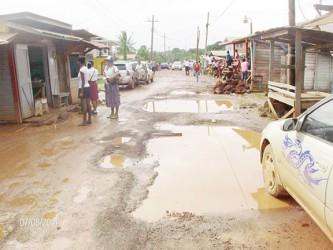
Mabaruma is a tranquil hillside community surrounded by several satellite villages, with the Regional Democratic Council Chairman, Paul Pierre pegging that number to be about 60 for the entire region. It is a predominantly Amerindian area which has seen an influx of other ethnicities over the decades resulting in a mixture of cultures.
The society is a cash-based one with no financial institutions, technological or other modern-based business to be found anywhere. In fact it is a locale of little commerce and employment opportunities for residents whose main way of life is subsistence farming and labouring for the businessmen who need the help. The main source of employment in the locale is the Government of Guyana, encompassing the various Ministerial offices represented in the Regional Administration Office Compound, the staff that comprise the administrative offices, the nurses, Police officers, the toshaos (village captains) and Community Service Officers throughout the various villages in and outside of Mabaruma. The internal transport sector provides for some employment as there are more than 10 buses that ply the routes from Kumaka through Mabaruma and those that travel to the outlying communities of Hosororo, Wauna, and Whitewater. The longer distance trips however are few, primarily to accommodate school children and usually end at 3:00pm. There is also a much larger number of taxis that work the same routes or special drops. This reporter would conservatively estimate that number to be over 40.
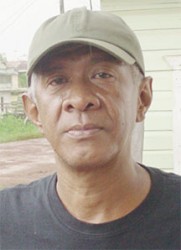
Leroy Hercules
After residing for the better part of a week in Mabaruma, getting to know the people and the area, this reporter can say that life is difficult for Mabaruma residents. Starting with the condition of the roads. There isn’t a single stretch of road that isn’t deeply eroded or engulfed in pot holes. One needs a very long and sturdy pair of rain boots to traverse the muddy roads throughout the Mabaruma Township and beyond. What is more disconcerting is the state of the very livelihood of the town, the Kumaka Market, where there is a very large pool of thick and thin layers of mud in a deep hole. Swamp-like conditions cover the connecting roadways of the market making it a difficult place to shop. Such a situation isn’t very conducive to business, as several vendors complained.
These squalid conditions are as a result of poor maintenance though the RDC Chairman, Paul Pierre said that the roads are maintained at half-yearly intervals, using mud rocks collected from the outskirts of Mabaruma to fill the pot holes instead of a comprehensive maintenance programme using more traditional materials. Several, knowledgeable residents identified exactly what the problem was, citing the use of inferior materials. Many of them opine that sand and granite stones are needed to properly fix the roads and that it would be much more effective to invest the sums needed to import the requisite materials than to do “slap-dash” works year after year. The length of time that roads have been in disrepair varied from individual to individual but the average estimate was ten years.
The condition of life for the thousands that reside in Mabaruma gets worse. Water is only provided for approximately one hour, three times a week, from the Guyana Water Incorporated pump stations. Electricity
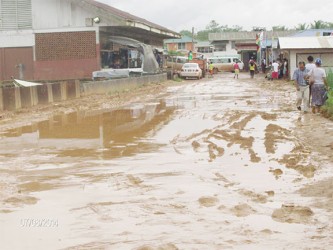
is provided by the Regional Administration Office from 5:00pm to 11:00 pm daily, with fluctuating voltage, according to residents. Individuals pay an estimated sum for their mediocre supply of electricity, based on the electrical appliances in their home. Many individuals however have generators to supplement their electrical consumption. Indoor plumbing is common to some parts of Mabaruma whilst many utilize outdoor lavatory facilities.
Mabaruma is managed by the Mabaruma Neighbourhood Democratic Council (NDC) headed by Osmond Willis for the past two years. The NDC is bounded by the Atlantic Ocean to the north, west by Venezuela, east by the Imbotero and Barima Wainaina Creek and south by the Koriabo, Barima and Aruka Rivers. It currently functions with 12 councillors, with nine individuals being appointed public servants and the other three from the original list of candidates that contested the 1992 elections. The 1992 elections saw the election of nine PPP/C and nine PNC councillors, resulting in the council deciding on rotating chairmanship. This ratio is not reflected in the current council. The NDC is administered by an overseer, staffed with a tractor operator and two porters, with labourers hired as needed. They operate with a sole tractor/trailer which is used for garbage collection.
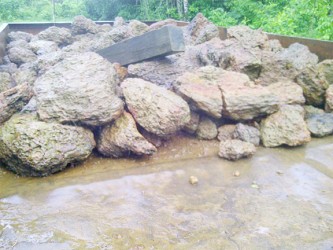
Speaking with Stabroek News was Chairman Willis, who stated that the state subvention of $3M is what he has to work with. This is necessary since the area does not pay rates and taxes due to a large number of untitled lands and the lack of valuation thereof. He had explained that he is pushing for a Ministerial order to appraise the lands, hoping to have land titles issued in order to collect rates and taxes. He also indicated some optimism towards being able to at least collect rates and taxes on the buildings that occupy the lands if he is unsuccessful in getting land titles issued. Searching through his records, Willis was able to reveal the 2014 subvention as $4.3M. When asked if he faces any delays and/or interferences from Central Government or the Regional authority, Willis, said, “We don’t get that kind of trouble here”.
Highlighting the achievements of the council, Willis said that, he is proud to have successfully regularized garbage collection, generating enough revenue to cover the cost to deliver the
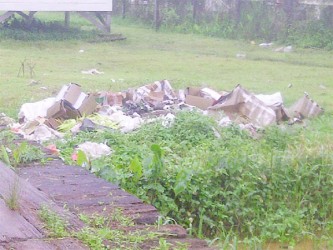
service, a cost the residents were happy to bear. Adding to his accomplishments, he pointed to numerous bus sheds he was able to rehabilitate, which were noticed by this reporter on his journey throughout the region. Willis then indicated that a number of public wash rooms were also renovated but these weren’t very conspicuous to this reporter. He also praised his council for being able to establish three access roads, laying the foundation work necessary for an asphalt road.
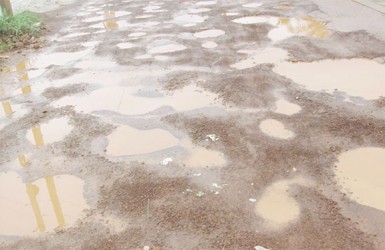
Describing his personal experience as a leader, Willis said, “We have to adjust to the changes and as we go along I hope that our people will come to terms and adapt and thus improve our community”. When asked of his thoughts on the withholding of Local Government Elections (LGE) for the past 20 years and whether he supported the call for it, he had this to say, “If LGE is required by law and we are subject to the law, then we ought to subject ourselves to it”. He added, “However, we need to be aware of the circumstances that would prevent it from happening but it must be acknowledged, that it is the right of every Guyanese to vote at LGE, and that right should be respected”. Asked if he would contest the election, if held, Willis responded, “I’m a people’s man, if they want me to contest, I’ll contest”.
What the people say
Twenty-nine-year-old Zeanni spent most of her childhood in Mabaruma and has some fond memories of the community but believes that it is too quiet, especially having experienced 14 years of life outside of it. Being the daughter of the community commerce leader, Monty Broomes, she comes from the privileged among the people of Mabaruma. Zeanni however still longs for more excitement in her beloved hometown.
With regards to the living conditions, Zeanni says that people have to endure without electricity for 18 hours, with service being rendered from 5pm-11pm. She pointed out that the hotel generates its own electricity but cannot afford to offer it to customers for a full 24 hours. She added that water isn’t constant, the availability and quality she did not know, since the hotel has its own well. Addressing the obvious eye sore, the roads, she called them “terrible”. She said, “they “fix” the roads constantly yet the condition does not improve”, adding that mud and bricks dug from the outlying villages are used to fill the holes which makes the environment messy during the rain. Flashing back to a time now past, she said, “At one time I could remember the roads being in a much better shape, it wasn’t perfect but it was better than this”.
Opining that there is much that the government can do to develop Mabaruma, she stated that the basic amenities is a great place to start. She supplemented this saying, “They can then focus on establishing institutions to cultivate and harness
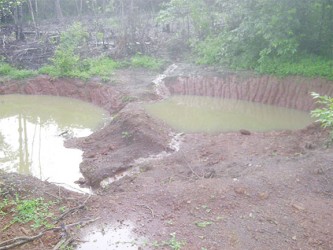
youth skills and create opportunities for them since none really exists”.
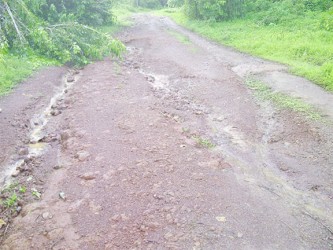
When asked of her knowledge of the NDC and Local Government, she admitted to knowing little except that garbage is collected for a small fee. In Kumaka, she highlighted that many persons litter but there are identified spots that the garbage is concentrated, and it is then picked up by the NDC. She explained that those who don’t use the NDC service, dig holes and burn their garbage. Sharing her thoughts on LGE, she said, “I think that 20 years is too long. There needs to be a change so new vibrant people can take over”, as she pledged her support to the call for local government elections and promising to vote.
Former Regional Councillor, Michael Hope, who served from 2005 to 2011, says, “As far as I have noticed, the road has suffered for the past 10 years”. He went on to say that the administration uses inferior materials to build and repair the roads and that he has tried on many occasions to address the issue to no avail. Acknowledging that he was no expert, and that it does not take an expert to realise this, he said, “You cannot use bricks and mud rocks to fill potholes”. He added that the administration should take a step back and stop wasting money on ineffective road repairs. He continued, “Simple granite and sand is all you need to build these roads with foundation it needs to last”. This he said can be imported, at a substantial but necessary cost, which will save money in the long run.
Continuing down a list of complaints, Hope pointed to the water transport system, which he says has become unreliable with services being rendered every 21 days or so when it should be rendered every 14 days. He says that the vessel has long outlived its usefulness, with constant mechanical breakdowns causing it to be docked for months placing an unnecessary strain on the sister ship, Lady Northcote, which too has outlived its usefulness. The two ships were to be replaced years ago, Hope exclaimed, explaining that the Ministry of Public Works made official statements in this regard but is yet to deliver. The garbage situation, he added is a hazard. He said, “Persons are dumping in Kumaka and the Aruka River, filling it with plastics and other non-biodegradable stuff”. He alleged that several businesses also dump their refuse along the roadsides without care. He indicated that a dumpsite was identified in Khan Hill but was never made official and believes that they have already started using it without any sort of construction. A disappointed Hope said, “During my time at, as I refer to it, the highest decision making forum of the region, decisions made would be distorted by the Ministry of Local Government, rendering them ineffective on the ground”. He continued, “sometimes, we would ask for projects we can’t afford but they would always say that they don’t have money’. He added, “I believe that this has persisted and has resulted in the conditions of life you’re seeing now”.
Non-functional
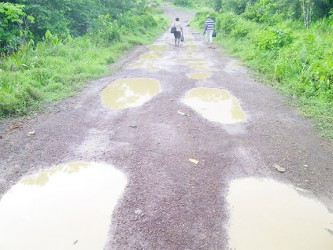
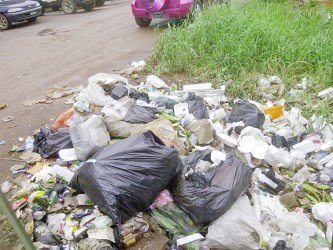
Speaking of local government and the NDC, Hope opined that, the council has been non-functional for the past few years, alleging that they hardly do anything. Citing their responsibility for fixing access roads, he labelled them “distressed”. Moving on to LGE, Hope said that he had a working knowledge of the system but does not know all there is to know. Asked about his thoughts on the 20 years without the election, he said, “The delay in the holding of the constitutional election is one of the things that hinder progress in Mabaruma”. He added, “The lack of the elections, retards the urge for progress, for if the elections were held regularly, people would be motivated to do better and that the living conditions of everyone would have been progressively improved”.
Resident taxi driver, Troy Hernandez, cited the biggest problem he faces in Mabaruma as the deplorable condition of the roads. He said that he purchased his car about one year ago and has already spent over $300,000 on maintenance, replacing shocks and bushings frequently. He added that the vehicle in general is worn down at a much faster pace, reducing the life-span and overall usage of it. Being a taxi driver for the past four years and a former bus driver, the 41 year old blames the regional authority for the high cost people have to pay to get around. He said that there are many other issues that face the community but believes that the roads are the most prominent and that if fixed even if one mile is done at a time instead of wasting money to “repair” then eventually it would get done. This he says is desperately needed to uplift the entire area, including the outlying villages, alluding to improved commerce and activity in general as a result of improved transport. He continued, “People would be able to bring out their farmed goods and improve business”.
Hernandez said, “I don’t want to bad talk my community but principle is principle and the roads are bad. They’re paying contractors to fix the roads for years and it still can’t be fixed. Filling pot holes and paying out money is not fixing the road!” Talk about the elections led Hernandez to make this remark, “We need the elections because we need to replace these individuals who would have otherwise been out office after their three years was over”. Pledging his support to the call for LGE, Hernandez said that he would not contest but would much rather his wife do so while he would also be involved.
Man of many trades, Leroy Hercules, 54, said that he has been a gold miner, taxi driver and a subsistence farmer, separately and altogether. He grew up in Hosororo and lived his life in and out of the Mabaruma district. He opined that in order
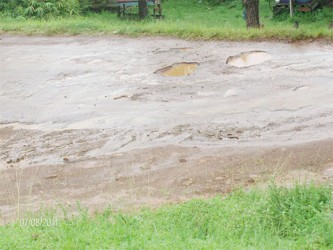
for Mabaruma to grow, the roads need to be fixed, electricity and water needs to be in better supply and basic infrastructure has to be developed. He said that the short electricity supply spoils food in an ordinary man’s fridge and that a businessman would need to incur the significant cost of a generator and daily fuel just to ensure his business can stand a chance. He went on to say, “Right now the football is on and many people can’t be part of the world cup because of the situation”. He praised the Government for the extensive renovations made to the North West Secondary School and the Regional Hospital that was built just over a year ago.
On LGE, he said, “The withholding of LGE is wrong”. He continued, “People are being deprived of their democratic right”. He said that people deserve to have their own immediate organisation/representation to address their issues, but that the lack of the elections breaks down the whole process. Hercules listed the things he’d like to see addressed with priority. Starting off with job creation, he said, “The Government cannot continue to be the major employer here because they have a stranglehold on the people”. Continuing along the same line, he said, “We need major development here and the government could start by stimulating farming and improve the transport system so that people can earn a decent living”. With a focus on children he said, “The rehabilitated Secondary School is good but it still doesn’t address the issue of where the children go after they graduate”.
“They have to leave to find work or to further their education”, he said. Ending on a positive note, Hercules said he loves his community because its peaceful, the people are friendly and it’s absolutely crime free.





